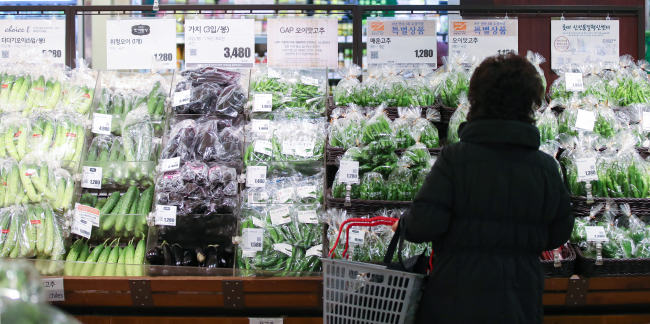South Korea’s consumer prices in December grew at the slowest pace in five months due to government cuts of the fuel tax and gas fees, but prices of agricultural goods and dining out maintained a steady uptrend, data showed Monday.
The consumer price index for December rose 1.3 percent from a year earlier, down 0.3 percent from the previous month and marking the lowest on-year rise since the 1.1 percent observed in July, according to the data released by Statistics Korea.
The rate of increase, which had previously remained under the 2 percent mark for 11 consecutive months, recovered in September but once again dipped back into the 1 percent range in the last month of the year.
Throughout the entire year 2018, the consumer price index climbed 1.5 percent from a year earlier, down from 1.9 percent in 2017.
 |
A consumer does grocery shopping at a Seoul retail store on Monday. (Yonhap) |
Agricultural, livestock and fishery goods rose 5.2 percent on-year in December, pushing the average index up 0.3 percentage point. Vegetables showed the sharpest price increase, up 10.7 percent from a year earlier, reflecting a supply shortage caused by a smaller cultivation area.
Among industrial goods, petroleum products marked a 2.8 percent decrease, the first signs of a downtrend in 25 months, the data showed.
Electricity, water and gas fees climbed 1.4 percent, as compared with 1.5 percent in the previous month, reflecting the impact of the latest gas fee discount measures.
While service charges increased 1.5 percent, dining prices showed the sharpest rise, up 3.1 percent from a year earlier, pulling up the average consumer price index by 0.4 percentage point.
“Climate change, such as the record heat wave in summer and the high global oil prices, steered inflation but a downtrend in housing fees and gas fees offset the rise,” said an official with the statistics office.
(
tellme@heraldcorp.com)








![[Today’s K-pop] Blackpink’s Jennie, Lisa invited to Coachella as solo acts](http://res.heraldm.com/phpwas/restmb_idxmake.php?idx=644&simg=/content/image/2024/11/21/20241121050099_0.jpg)